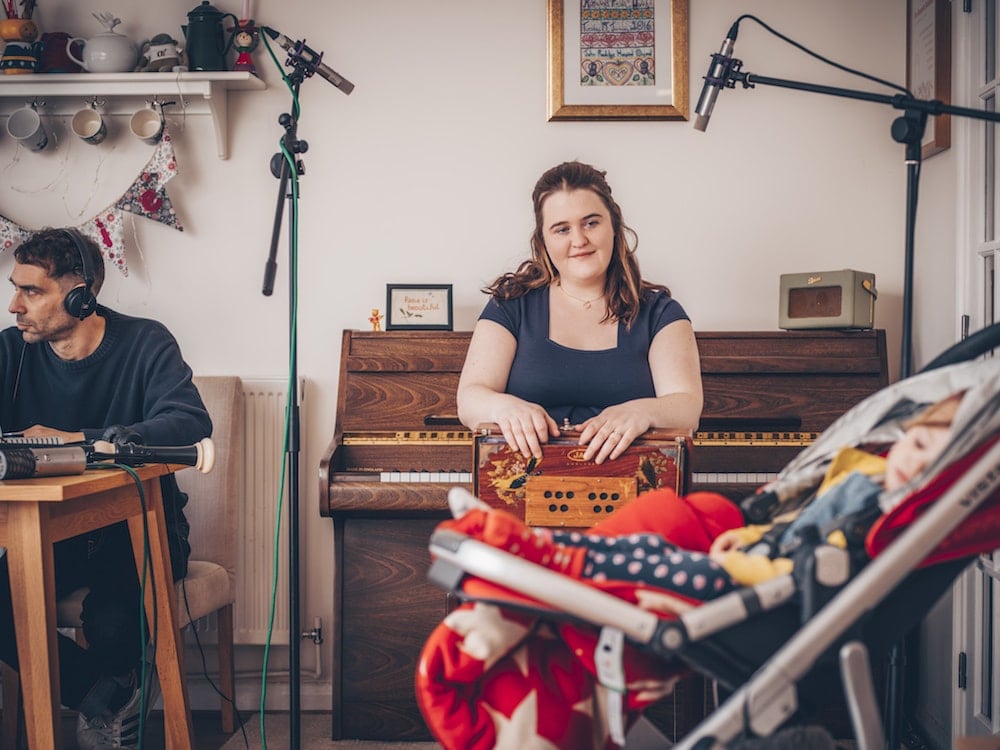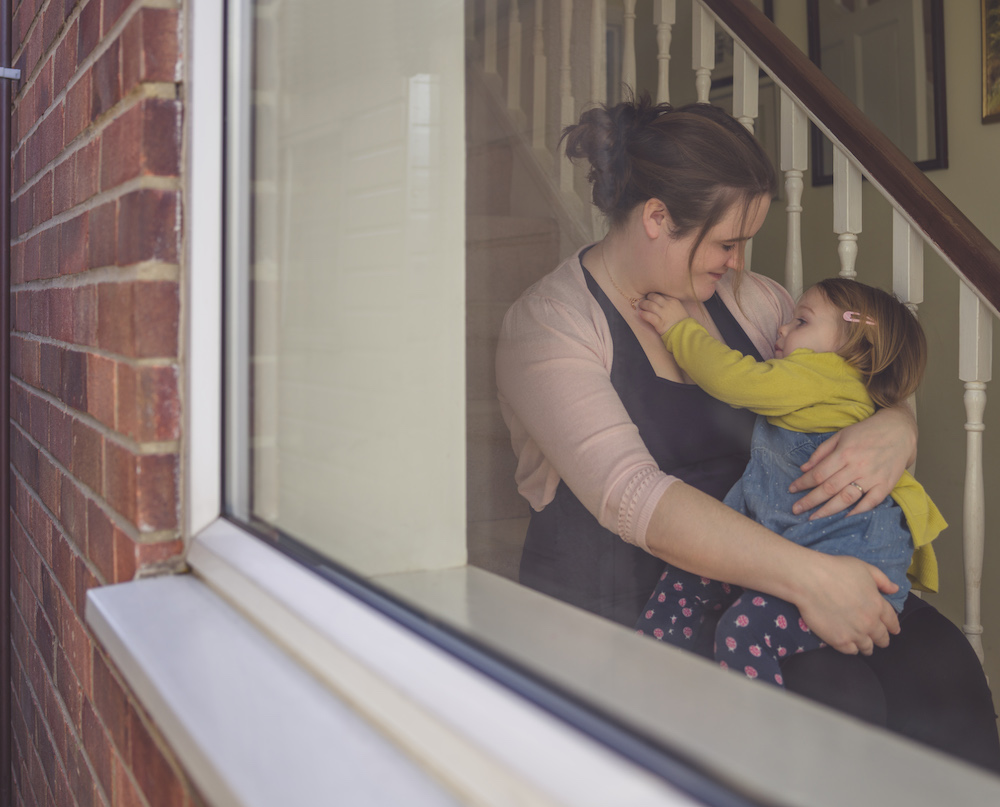Jackie Oates’ new album is called The Joy of Living. It’s an outwardly optimistic title, and a fitting one given that it was conceived and recorded in the months after the birth of Jackie’s daughter, Rosie. But the title doesn’t tell the full story. Five days after Rosie was born, Jackie’s father died. The intensity of emotion, the highs and lows of that period, were channelled by Jackie into the most personal and heartfelt of records.
She took the time to talk to Folk Radio UK about the creative process behind the recording of such a beautiful and cathartic album, and we were keen to know whether she set out to make an album that was explicitly about the themes of joy and loss, or whether these themes emerged naturally as the sessions progressed. Her answers provide a rare insight into a method that is both unorthodox and entirely natural.
‘[Producer and fellow Imagined Village member] Simon Richmond and I didn’t really realise that we were making an album until about six months into the process. We set about recording demos in my kitchen because we were really limited with childcare and I didn’t really have the capacity to plan ahead and think about what we were recording and where we were heading. So we assumed that we’d eventually book some time in a proper studio to re-record the songs that we’d been experimenting with. The songs evolved in a very organic way – they happened to be the songs that I’d been fixated with whilst I was coming to terms with all manner of things that life had thrown at me.’
For some artists, a creative career can be incompatible with family life, but for Jackie, it seems that the opposite is true: music is something that binds families together, and folk music in particular, with its propensity to be passed down orally through generations, lends itself to being sung and played in family groups.
‘I find that folk songs have an incredible power to remind me of who I am and where I’ve come from and of the things and people who I value the most. After I lost my Dad I was preoccupied with finding little pockets of time when my daughter was sleeping, to write down my thoughts or to collate all the photos I had in order to try to preserve the memories that I was scared would fade away. I never managed this but what I hadn’t realised was that I was remembering him every time I sat at the piano and sang, or listened to music that he’d introduced me to.’
Jackie rarely composes her own material, but finding that time to write down her thoughts may have been what prompted her to write and record a song of her own (Spring Is Coming Soon) on what is otherwise an album of covers and traditional songs. Is this a one-off, or the start of a new direction?
‘I am a very shy song writer. I have written the occasional song before becoming a mum but I’m too aware that my lyrics are going to be scrutinised. I think it’s the element of self-consciousness that I’ve struggled with the most. But when Rosie was born I couldn’t seem to help but write song after song for her. I think it’s a survival instinct that kicks in to relieve the monotony.’
Spring Is Coming Soon is incredibly personal and candid – it is similar in some ways to the recently released songs of Molly Drake, which were originally written to be performed for friends and family members. Is it difficult to share something so personal with thousands of listeners?
‘I’ve had to work really hard at letting go of this album because it is incredibly personal and is bound up in such raw and vulnerable feelings. I think in a past life, I would’ve been so anxious about the roughness of the vocals – which had to be recorded in one take, the improvisatory nature of the arrangements, and even the photos that had to be taken when I was once again pregnant and feeling like the last thing I wanted was to be photographed.’
It seems to me that Spring Is Coming Soon has some of the simplicity of a lullaby. Jackie has spent some time researching lullabies, and their influence on her music is clear.
‘I think the lullabies research really played into this album. It has often struck me how vastly different perceived parenthood is from the reality of it. I can only now fully appreciate just how powerful lullabies are – for children and their sense of safety and ‘all is wellness’ and for the sanity of parents.’
The traditional material on the album is drawn from a wide variety of sources – as well as lullabies there are books of playground songs and Christmas concerts. It is the sign of a musician who is constantly and consciously on the lookout for new songs or arrangements.
‘I love discovering new songs just as much as watching a really good film or wandering into a shop and discovering some little item of treasure! Its one of my great joys. Partly because it’s such a rare thing – songs have to really connect and move me to shake me out of everyday reality.’
As well as scouring the historical and traditional songs of the British Isles, Jackie Oates is known for recording varied and often unexpected covers (Bjork and the Sundays in the past, John Lennon and Darwin Deez on this album). Are these songs that she has been playing for years, or do new potential cover versions emerge during recording sessions?
‘I tend to be drawn to recording a cover version of a song because it belongs to a moment in time, that defines that period of my life. Often I’ll choose to make my own arrangement of that song because at the time it was an obsession! But one that I know will disappear when a new chapter emerges.’
At least as important as the choice of material is the way the songs are sung. Jackie has a unique voice (which I think somehow manages to be both haunting and conversational), and I am interested to know who she considers the biggest influences on her singing.
‘I see singing as a sort of therapy – it’s so intensely bound in emotion; capturing feelings that can’t really be expressed in any other way. I’ve felt this so much more since experiencing the profoundness of love and of loss. Dick Gaughan and Tim Eriksen have always been huge influences on me.’
Here she is performing a cover of Sandy Denny’s Who Knows Where the Time Goes? at Folk on the Quay 2018.
As well as making solo records, Jackie Oates is also a prolific collaborator. She is a longstanding member of the shape-shifting folk supergroup The Imagined Village, whose last album came out in 2012. I am keen to know if the project is ongoing, and if so are there any plans to release new material?
‘The Imagined Village have remained very close friends and we frequently work on very random little projects for Lush/ECC. There’s always talk of new outings and I’m hopeful that these will happen one day soon!’
This mention of Lush prompts me to ask about one of her more recent collaborations. Earlier this year she contributed to Lush founder Mark Constantine’s brilliant Self Preservation Society compilation. It seems to the outsider like an odd collaboration. How did it first come about?
‘Lush are a fantastic and very creative company. Mark Constantine is a keen bird watcher and Simon Emmerson first introduced him to a song of mine, ‘The Lark In The Morning’ when he was writing a book about bird watching, which included a CD! I was then asked to appear as a special guest at an Imagined Village gig in Bridport, where he was going to be in the audience. Since then I’ve been involved in countless pieces of music connected with various aspects of Lush life. I feel so fortunate to have been brought into their family.’
This idea of being in a musical and creative family brings us full-circle. Jackie is a well-travelled musician: she has been based in some very different parts of England (Exeter, Staffordshire, the north-east and now Wallingford) over the course of her career. How, if at all, has geographical location and travel shaped how her music sounds, and how does it fit in with being part of a wider musical family?
‘Geographical location has shaped my music hugely. When I was growing up, my musical fix came from annual holidays to Sidmouth Folk Festival, our record and CD collection, and the weekly session that my Dad used to play at. I was much more of a fiddle player then because I was far too shy to sing in public. Living in Devon hugely changed my musical style as I became fixated on ballad singing and then more unadorned/bare/balladic aspects of the tradition. Now I live in Wallingford and I’m at a stage of my life where everything is much more home-centric and I’m finding inspiration from the everyday. I love the way that folk music gradually introduces you to local musicians and their own geographically musical language.’
Track Preview
The Joy of Living is set for release on 24th August via ECC Records.
Details here: https://www.eccrecords.co.uk/product/the-joy-of-living-pre-order/
The Joy of Living Tour Dates 2018
30th June 2018: Folk On The Quay, Poole
7th July 2018: Kimpton Folk Festival
23rd July 2018: Chichester Folk Song Club
7th August 2018: Sidmouth Folk Week
12th August 2018: Dartmoor Folk Festival
25th August 2018: Oxford Storytelling Festival
15th November 2018: Kitchen Garden Cafe, Birmingham
16th November 2018: Pound Arts Centre, Fordham
17th November 2018: Tuppenny Barn, Emsworth
21st November 2018: The Greystones, Sheffield
24th November 2018: Shelley Theatre, Bournemouth
2nd February 2019: The Arc, Stockton on Tees
8th February 2019: The Platform, Morecambe
9th February 2019: The Met, Bury
10th February 2019: Whitstable Sessions, Whitstable
12th February 2019: Water Rats, London
13th February 2019: West End Centre, Aldershot
15th February 2019: Starcross, Devon
20th February 2019: Aberystwyth Arts Centre
3rd April 2019: Willows Folk Club, Arundel


